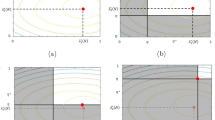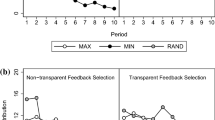Abstract
Experimental results are presented showing the effects of allowing real time revisions of voluntary contributions for the provision of a public good. Four public good payoff functions are examined, each of which generates specific equilibria. Evidence of increased provision of the public good is demonstrated for: (i) the case in which revisions are limited to increases and a provision point exists, and also (ii) when there is a high initial marginal return from the public good.
Similar content being viewed by others
References
Andreoni, J. (1988). Why free ride? Strategies and learning in public goods experiments. Journal of Public Economics 37: 291–304.
Becker, S.W. and Siegel, S. (1958). Utility of grades: Level of aspiration in a decision theory — context. Journal of Experimental Psychology 55: 81–85.
Dawes, R.M. (1980). Social dilemmas. Annual Review of Psychology 31: 169–193.
Frohlich, N., Hunt, T., Oppenheimer, J. and Wagner, R.H. (1975). Individual contributions for collective goods. The Journal of Conflict Resolution 19(2): 310–329.
Isaac, R.M., McCue, K. and Plott, C.R. (1985). Public goods provision in the experimental environment. Journal of Public Economics 26: 51–74.
Isaac, R.M. and Walker, J.M. (1988). Group size effects in public goods provision: The voluntary contributions mechanism. Quarterly Journal of Economics 103: 179–199.
Isaac, R.M. and Walker, J.M. (1988). Communication and free riding behavior: The voluntary contributions mechanisms. Economic Inquiry 26: 585–608.
Isaac, R.M., Walker, J.M. and Thomas, S. (1984). Divergent evidence on free riding: An examination of some possible explanations. Public Choice 43: 113–149.
Isaac, R.M. and Walker, J.M. (1987). Success and failure of the voluntary contributions process: Some evidence from experimental economics. Discussion Paper 87-1, University of Arizona Department of Economics.
Isaac, R.M., and Schmidtz, D. and Walker, J.M. (1987). The assurance problem in a laboratory market. Public Choice 62: 217–236.
Kim, O. and Walker, J.M. (1984). The free rider problem: Experimental evidence. Public Choice 43: 3–24.
Ledyard, J.O. (1986). The scope of the hypothesis of the Bayesian equilibrium. Journal of Economic Theory 39: 59–82.
Marwell, G. and Ames, R.E. (1979). Experiments on the provision of public goods I: Resources, interest, group size, and the free rider problem. American Journal of Sociology 84: 1335–1360.
Marwell, G. and Ames, R.E. (1980). Experiments on the provision of public goods II: Provision points, stakes, experience and the free rider problem. American Journal of Sociology 85: 926–937.
Marwell, G and Ames, R.E. (1981). Economists free ride: does anyone else?. Journal of Public Economics 15: 295–310.
Olson, M. (1971) The logic of collective action. Harvard Economic Studies Volume 124. Harvard University Press.
Palfrey, T.R. and Rosenthal, H. (1988). Testing for effects of cheap talk in a public goods game with private information. Working paper #87-88-41, California Institute of Technology.
Siegel, S. (1957) Level of aspiration and decision making. Psychological Review 64: 253–262.
Author information
Authors and Affiliations
Additional information
The author wishes to express his appreciation for the reviews and comments made by James Cox, Mark Isaac, Vernon Smith, anonymous referees and participants at the Public Choice/ESA conference in San Francisco, April 1988. The author is also very grateful for the economic support of the Economic Science Laboratory at the University of Arizona.
Rights and permissions
About this article
Cite this article
Dorsey, R.E. The voluntary contributions mechanism with real time revisions. Public Choice 73, 261–282 (1992). https://doi.org/10.1007/BF00140922
Received:
Accepted:
Issue Date:
DOI: https://doi.org/10.1007/BF00140922




